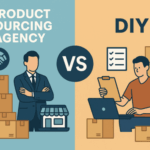Suppliers vs. Distributors: Who Should You Work With?
A strong supply chain is the key to a successful business. But how do you ensure you’re making the right choice? Should you work with a supplier or a distributor?
This decision impacts costs, delivery times, and overall business growth. In today’s competitive market, every step in the supply chain matters. A 2023 McKinsey study found that companies with well-structured supply chains grow 70% faster than their competitors. That means choosing the wrong path could hold back your business, while the right one could set you up for long-term success.
Understanding the differences between suppliers and distributors is crucial to making an informed decision. The two may seem similar, but they serve entirely different functions. To build a strong, scalable, and cost-effective supply chain, let’s break down what suppliers and distributors do, how they work, and which one is the best fit for your business.
What Is a Supplier? The First Brick in the Wall
A supplier is the first link in the supply chain. Whether you’re selling clothing, electronics, or food, suppliers provide the raw materials or finished goods that make your products possible. These businesses are responsible for producing or sourcing the items that other businesses will eventually sell to customers.
According to a report from Statista, 80% of global trade depends on suppliers. Without them, businesses across industries—from retail to manufacturing—are gradually leading to a declining position. Suppliers play a crucial role in the supply chain by ensuring businesses get the materials they need at the right time.
Types of Suppliers: Know Your Source
Not all suppliers operate the same way. The type of supplier you choose will depend on your business model, product needs, and overall strategy.
Let’s break them down into three main categories.
Raw Material Suppliers
Raw material suppliers provide the basic components that businesses need to create their products. A clothing brand sources cotton from raw material suppliers, while a construction company may get steel and cement. Without these essential components, production cannot begin.
Manufacturers
Manufacturers take raw materials and convert them into finished or semi-finished goods. For example, a factory that assembles smartphones is a manufacturer. Many businesses work directly with manufacturers to develop private-label products, allowing them to customize goods with their proper branding and company specifications.
Wholesalers
Wholesalers act as bulk suppliers. Instead of producing the goods themselves, they purchase large quantities from manufacturers and resell them to businesses at discounted rates. This makes them a cost-effective option for businesses that need inventory without being involved in direct manufacturing.
How Suppliers Operate: The Engine of Production
Suppliers use a clearly defined process to deliver products effectively. They source raw materials from various global markets for production. Then, manufacturers manufacture the products according to industry standards and quality guidelines. To ensure that everything stays consistent, suppliers have various quality control checks in place before shipping the items to buyers.
Once the products are ordered, logistics and fulfillment are all managed by the suppliers, who now complete the supply line to businesses, wholesalers, or distributors. Much more than that, some suppliers offer other services such as private labeling or custom packaging, basically providing businesses a better way to feature their products uniquely.
Pros and Cons of Working with Suppliers
Another big benefit of having suppliers is lower prices. You can access raw materials or services directly from their source and thus could eliminate intermediaries for better pricing. This would help companies to squeeze profit margins and cut costs.
The next significant benefit is customization. Most suppliers allow private branding, while distributors don’t. That is, businesses can sell products under their brand. This freedom is critical for companies that would like to carve out their unique space in the market and thus arm themselves with a competitive advantage.
With a supplier, businesses enjoy having full control over their product quality. Suppliers follow very detailed specifications; therefore, it is good for businesses to know their product, which eventually meets their expectations.
The Flip Side of the Coin: Challenges of Working with Suppliers
One major drawback to suppliers comes from bulk order requirements. They dictate that businesses have large minimum order quantities, which can be expensive and risky for the startup or micro business.
Long lead times also pose their challenges. Given that production and shipping could take anywhere from weeks to months, businesses have to be incredibly proactive with inventory planning to avoid stock-outs.
Moreover, whenever companies work with suppliers, they will handle their own logistics, warehousing, and inventory management. This requires considerable effort, time, and investment in setting up the whole chain, which is thereby less convenient for firms that do not have a well-established supply chain infrastructure.
What Is a Distributor? The Bridge to Customers
A distributor is one of such types of middlemen between the supplier and the retailer or business. They buy in bulk from suppliers, hold inventories, and sell to different businesses in smaller quantities.
It is a huge industry in distribution. According to IBISWorld reports, the distribution industry is worth more than $8 trillion in the U.S. alone. This is very easy as distributors pave the way in the supply chain and allow businesses to source products without obtaining supply and logistics management.
Types of Distributors: Picking the Right One
Choosing the right type of distributor depends on your business goals.
Exclusive Distributors
Exclusive distributors work with one brand at a time and focus on building their market presence. For example, Apple distributors sell only Apple products, ensuring strong brand positioning and market penetration.
General Distributors
General distributors deal with multiple brands and product lines. They help businesses reach larger markets by offering a wider range of products to retailers and wholesalers.
Regional Distributors
Regional distributors specialize in serving specific geographic areas. They have established networks in local markets, making them an excellent choice for businesses looking to expand into new territories.
How Distributors Operate: The Shortcut to Sales
Distributors are the ones who purchase goods from suppliers in bulk, store and take care of these goods as inventory, and finally distribute products to retailers or businesses. Giving distribution support, they also often help in marketing and sales.
They help their partners to promote their products, open up new markets, and take care of customer relationships. This added value for distributors makes them a preferred choice for businesses that want to grow quickly. Rewriting: Distributors do not just distribute. They also help in marketing and advertising.
Pros and Cons of Working with Distributors
The Bright Side: Advantages of Working with Distributors
Faster market access is one of the principal advantages of having a distributor. Distributors have their networks, allowing companies to venture into new markets with no great capital outlay.
Lower logistics burden is yet another advantage: companies will not bear the hassle of storing, inventorying, and shipping. This will all be handled by the distributor, thus freeing the company to focus on sales and growth.
Distributors also allow for scaling more easily: as distributors deal with the complexities of the supply chain, companies can scale up operations without the hassles of direct sourcing.
The Trade-Offs: Challenges of Working with Distributors
Distributors produce a major drawback, which is cost. Businesses always pay more for a product because most charges added by a distributor are ultimately paid by the business.
Another defect is limited control over pricing and branding because distributors manage the sales and marketing of the products. Thus, companies will be less impactful on how their products are marketed.
Also, distributors usually handle several brands, and for this reason, your product may not be given due attention. Businesses must identify the distributor who would most align with their growth strategy.
Any further drawbacks of any distribution channel include cost. All businesses end up paying more for their products since distributors even add their customers’ markups. Again, they limit control because the distributor handles four parts of the entire selling and marketing aspects of the business, which are sales and marketing. Thus, they have less impact on how their products are marketed. Another drawback is multiple brands, usually handled by distributor brands, for which your product might not get any attention. Businesses must ensure they select a distributor who aligns with their growth strategy.
Choosing Between a Supplier and a Distributor
The decision depends on several factors, including business model, budget, scalability goals, and customization needs.
If you need expert guidance on optimizing your supply chain, check out BrandNewMd for solutions tailored to your business. Looking for the best sourcing partner? Work with BrandNewMd for cost-effective and efficient supply chain management!
Also, check out these top picks from BNMD, specially curated to enhance your knowledge.









